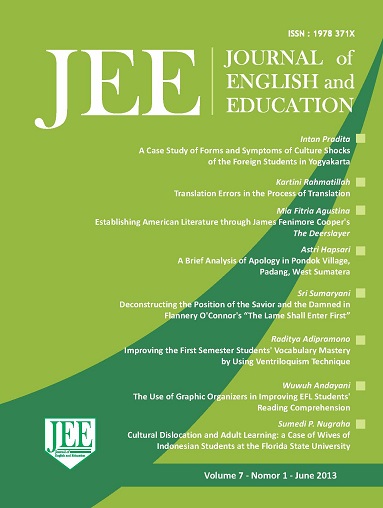Main Article Content
Abstract
The objectives of this research are to find out whether teaching vocabulary by usingventriloquism as a teaching aid is effective, how this technique can improve students’ vocabulary, and whether there is any significant difference between students taught before the treatment and after the treatment. This research is an action research. The respondents of the research were selected randomly. The respondents are 45 students of the first semester of English Department Faculty of Letters Ahmad Dahlan University in Academic Year 2011/2012. The research instrument used by the researcher was the test and questionnaire. The data in the research are mainly gathered through the use of pre-test and post-test. After the data were collected, the researcher analyzed them. The researcher used questionnaire to see the students’ response to this method when it was applied in teaching and learning process. The questionnaire was used to support the primary data from the teaching learning activities and the test. The finding of the research shows that there is a significant difference between teaching vocabulary before using ventriloquism and after using ventriloquism. Before the treatment, the mean is 59.35, the standard deviation is 6.47. After the treatment, the mean is 74.77, while the standard deviation is 15.99. It means that there is a significant difference in teaching vocabulary before using ventriloquism and after using ventriloquism.
Keywords
Article Details
Copyright (c) 2017 JEE, Journal of English and Education

This work is licensed under a Creative Commons Attribution-ShareAlike 4.0 International License.
Authors who publish with this journal agree to the following terms:
- Authors retain copyright and grant the journal right of first publication with the work simultaneously licensed under a Creative Commons Attribution-ShareAlike 4.0 International License that allows others to share the work with an acknowledgment of the work's authorship and initial publication in this journal.
- Authors are able to enter into separate, additional contractual arrangements for the non-exclusive distribution of the journal's published version of the work (e.g., post it to an institutional repository or publish it in a book), with an acknowledgment of its initial publication in this journal.
- Authors are permitted and encouraged to post their work online (e.g., in institutional repositories or on their website) prior to and during the submission process, as it can lead to productive exchanges, as well as earlier and greater citation of published work (See The Effect of Open Access).

